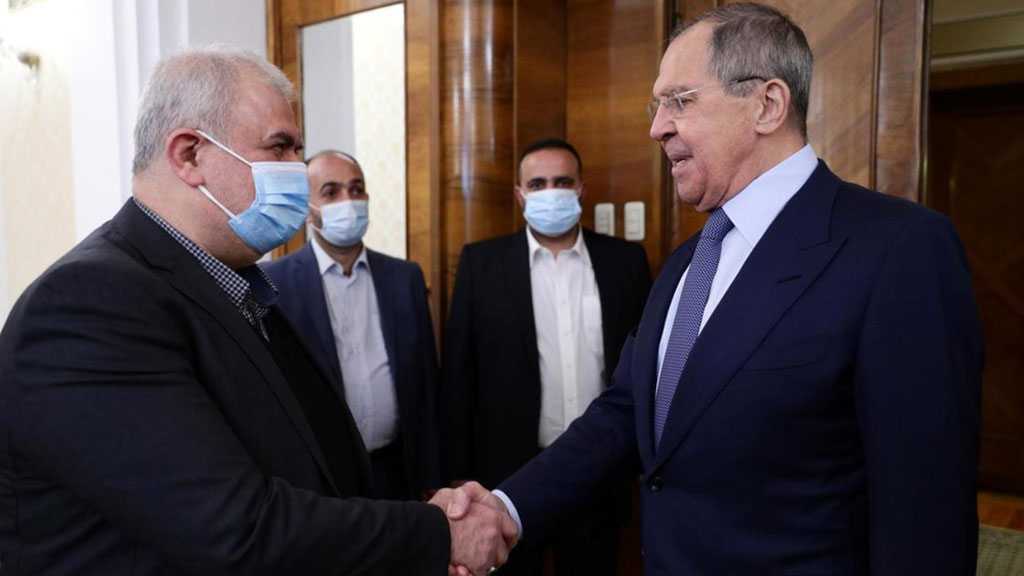
Russia Tells Hezbollah: We Want You to Stay in Syria

By al-Akhbar Newspaper, Translated by Staff
Over the past years, media outlets hostile to the Syrian regime and its allies [individually and collectively] have published a lot of reports and “information” about actions and measures that Russia has begun to implement to get Hezbollah and Iran out of Syria, or at least reduce their presence there. These reports were based on an assessment that Russia does not want a partner in influence in the Levant, especially the Iranian influence. In the field, it was the opposite that governed the relationship between the parties, there was cooperation on more than one level, and sharing roles sometimes. And when something was not agreed upon, the issue was resolved by regulating the disagreement.
The visit of Hezbollah’s delegation, led by MP Mohammad Raad [a member of Hezbollah’s Shura Council and head of the Loyalty to the Resistance parliamentary bloc], to Moscow, in the middle of last month, was an occasion in which the Russian leadership clarified its position on the party's presence in Syria. In Moscow, Hezbollah's military performance is highly appreciated on the level of professionalism, discipline and the superior ability of its fighters to achieve their battle goals. At the same time, Moscow admires Hezbollah's "pragmatism." In the latter regard, it seems concerned with everything that contributes to the protection of the Syrian state, in particular the internal settlements with armed groups in many regions, especially in the south, and the major understandings with Turkey. In either way, the party was committed to everything that could be done to make these settlements and understandings successful.
In Moscow, the military and politicians consider Hezbollah's presence in Syria more necessary than ever. Any gap left by Hezbollah and Iran in any Syrian province will be filled by the Americans, neither the Russians nor the Syrians. Moreover, some settlement groups, including those who are strengthened with the understanding with the Russians, see no deterrent to their extension except for Hezbollah and the Iranians.
In this spirit, Russian officials have been keen to convey a clear message to Hezbollah’s leadership: Your presence in Syria is as necessary in politics as in the military. We count on future cooperation in both fields.
The Russians do not consider Hezbollah as a Lebanese organization, but rather as a side who has presence in many States of the region. In the meetings with Russian officials, specifically Foreign Minister Sergey Lavrov, his deputy Mikhail Bogdanov, and officials in the parliament, the situations in Yemen, Iraq, Syria, Palestine and others were discussed. The parties stressed the need to strengthen their communication and to adopt direct channels of communication between Hezbollah and Moscow, while studying the possibility of establishing a representative office for the party in the Russian capital.
The visit, that was based on a Russian invitation, appeared to be a message from Moscow to Washington that “the ongoing attempts to entrap us up with Iran or Hezbollah will not work. We will not only coordinate with Iran; we want to coordinate directly with Hezbollah.” The Russians have already informed all Western, Arab and regional States and powers that they communicate with about Lebanon that "Hezbollah is a major force, a real and significant case, that should be dealt with on this basis, and that no settlement can be achieved without consulting and agreeing with it.”
Another message Moscow wanted to deliver to Tel Aviv is that it is true that Russia seeks "an understanding with everyone" considering Syria, and there is an understanding between it and ‘Israel,’ but this understanding does not mean "we are helping ‘Israel’ in its strikes. On the contrary, we condemn these strikes, especially those passing through the Lebanese airspace. We remain committed to preventing ‘Israeli’ aircraft from penetrating Syrian airspace.” On one hand, Moscow confirms, based on its intelligence information, that the ‘Israeli’ strikes on arms convoys transported to Lebanon did not achieve their goals and did not prevent Hezbollah from achieving their goals. On the other hand, it does not object to the establishment of a deterrent equation that would prevent ‘Israel’ from attacking the Syrian territories. In the coming months, there is a trilogy that Moscow is seeking to secure the factors for its success in Damascus: the political process linked to the presidential election station, reconstruction, and the return of refugees.
In Lebanon, the Russians insist on not to interfere as other countries do. They do not interfere in the formation of the government, they do not participate in the composition process, and they do not demand shares. It is true that they are interested in the reconstruction of the port, for example, just as they are interested in energy projects, whether those in which they are involved in [oil and gas exploration in the sea, fuel tanks at Beddawi] or those in which they aspire to participate in in the future, such as the reconstruction and operation of the Tripoli refinery. Here, the Russian interest in the sea gas seems remarkable, as estimates in some Moscow-based jurisdictions talk about a huge amount of gas in the Syrian and Lebanese seas. And if those estimates are correct, it is not unlikely that Russia will implement a gas pipeline project in the eastern Mediterranean competing with the “Eastern Mediterranean Gas Forum” project [involving Egypt, ‘Israel,’ Cyprus, Greece, Jordan, France and Italy], to transport gas to Europe via Turkey.
Considering Yemen, Moscow seems interested in finding a settlement that saves the Saudi prestige. While for Hezbollah, the key to the solution is to stop the aggression and lift the siege simultaneously, and Ansarullah are keen not to antagonize anyone, except those who take the initiative to start a fight.
Comments



